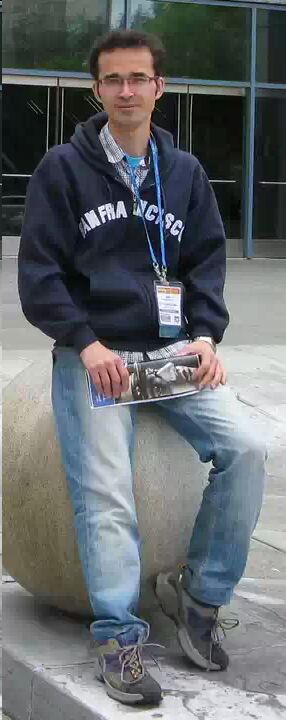
Omid Kokabee
It was the end of January 2011. Young Iranian physics whiz Omid Kokabee had just had a pleasant winter break visiting with his family in Iran and was eagerly anticipating returning to Austin to continue his doctoral studies in the Physics Department at the University of Texas. He was at the airport in Tehran when security agents approached him; instead of boarding his flight as planned, his life suddenly turned into a nightmare from which he has yet to awaken.
It is now three years later and Omid Kokabee sits in Evin Prison in Tehran, serving a ten-year prison sentence after being convicted in a Revolutionary Court of unsubstantiated charges of “communicating with a hostile government” (presumably the U.S.) and “accepting illegal funds” (apparently a reference to the stipend that graduate students at his department typically receive).
While in detention, he was held in solitary confinement, subjected to prolonged interrogations, and pressured to make a confession. His interrogators reportedly threatened that he would be tortured and that professors at Iranian universities with whom he had worked would be arrested. During questioning, he was reportedly made to write down details of individuals he had seen in embassies or at conferences, and was told by those questioning him that some of the people he had met were CIA operatives.
Amnesty International has declared him to be a prisoner of conscience, held solely for his refusal to work on military projects in Iran and as a result of spurious charges related to his legitimate scholarly ties with academic institutions outside of Iran. AI calls for his immediate and unconditional release from prison.
In September 2013, Omid Kokabee was awarded the Andrei Sakharov Prize from the American Physical Society for “his courage in refusing to use his physics knowledge to work on projects that he deemed harmful to humanity, in the face of extreme physical and psychological pressure.”
Omid Kokabee is not the only scientist who has been persecuted by the Iranian authorities for their alleged involvement in a U.S. government orchestrated conspiracy to undermine the Islamic Republic.
Hamid Babaei was pursuing doctoral studies at the University of Liege in Belgium and was summoned for questioning by the Ministry of Intelligence in July 2013 while he was in Iran visiting his family. When he refused to cooperate in passing information about Iranians in Belgium, he was arrested and transferred to prison. Later, he was charged with “communicating with hostile foreign governments and espionage.” He was sentenced to prison in December 2013 by the same notoriously harsh judge Abolghasem Salavati who had sentenced Omid Kokabee.
In addition to being a brilliant and promising young scientist, Omid Kokabee was widely beloved by his teachers and fellow students wherever he went – when he did graduate work at the Institute of Photonic Sciences at the Polytechnic University of Catalonia in Barcelona and also at the University of Texas. His friends and colleagues at the University of Texas created a video in which they testify to their admiration for his character and his dedication to science, and plead for his release.
A new joint petition sponsored by Amnesty International USA, the Committee of Concerned Scientists, the American Physical Society and United4Iran was just launched, calling for his immediate and unconditional release. Our goal is to collect as many signatures as possible to present to the Iranian government.
Please take a minute to sign the petition, and urge all your friends, relatives and colleagues to do so as well. We hope that the outpouring of support will ensure that Omid Kokabee will not have to mark a fourth anniversary in prison.